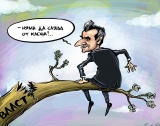АБОНАМЕНТ ЗА НОВИНИ [X]
Какво призна Орешарски пред Bloomberg
 11:15 | 13.11.2013
11:15 | 13.11.2013 1364
1364  коментари 0
коментари 0
За следващата година планираме голяма емисия еврооблигации от порядъка на поне 1 млрд. евро, която ще бъде необходима за рефинансиране на дълга. Това посочва министър-председателят Пламен Орешарски пред Bloomberg. Наред с това се предвижда регулярен интензитет на вътрешни емисии, също за рефинансиране на дълга и за финансиране на дефицита. Като се отчита, че дефицитът е около 1,5 млрд. лева, приблизително толкова ще излезе нетната емисия на дълг, а за брутната емисия – към нея трябва да добавим и излизащите в падеж емисии, на които ще бъде направено превъртане, казва премиерът, цитиран от правителствената пресслужба. По думите му, заемът от 360 млн. евро ще се използва за рефинансиране на дълга и за финансиране на дефицита до края на настоящата година. На въпрос за облигациите на БЕХ , отговорът на Орешарски е, че голяма част от тях ще се използват за рефинансиране на стари дългове, както и за инвестиционни разходи.
Попитан за „Белене“, Орешарски заявява, че проектът е на стадий анализ и преценка – на първо място за дългосрочните нужди от електроенергия на нашата страна и региона, както и на възможностите да бъде привлечен стратегически външен инвеститор. Страната няма възможности да строи със собствени средства, така че е ключово наличието на стратегически западен инвеститор, смята премиерът. На въпрос за 7-ми реактор на Козлодуй министър-председателят заяви, че се работи и по този въпрос. „Не сме прекратили дейността, тъй като считаме, че има място да се разработва и такъв вариант. Стадият е предварителен, казва премиерът Орешарски.
Ключовото предизвикателство както тази година, така и следващата ще бъде възстановяването на икономиката. Премиерът отбелязва, че очакванията за следващата година са да има по- висок растеж от настоящата, като в бюджета е записан 1,8%. Фактори за това са по- високото вътрешно търсене, както и малко по- високото външно търсене, което ще даде възможност за ръст на експорта. Прогнозира се по- високо ниво на преки чуждестранни инвестиции и като цяло по- високо ниво на инвестиционната активност вътре в страната. Цифрата в Закона за бюджета е малко под 2 млрд. евро.
Помолен да изтъкне важно постижение на кабинета за изминалите няколко месеца от началото на мандата, министър-председателят отбелязва постепенното възстановяване на инвестиционния климат. „Освободихме страната от страха. Мисля, че това се отразява в по- висока инвестиционна активност. Надявам се да го видим като тенденция и в макроикономически план следващата година“, каза премиерът. Той изтъкна облекчението на административните тежести, по- регулярното възстановяване на ДДС, разплащането на заварени задължения към бизнеса и най- важното – отказът от ползване на репресии спрямо стопански активните хора в България.
По повод протестите, Орешарски посочва, че смяната на правителства не трябва да предизвиква изкривяване на цели, когато те са достатъчно добре дефинирани и доказали се като работещи в полза на обществения интерес.
Bulgaria Plans $1.34 Billion Bond Sale in 2014, Premier Says
Bulgaria plans to tap international bond markets next year for the first time since 2012 to repay maturing debt, Prime Minister Plamen Oresharski said, pledging to resist protests demanding his resignation. The government plans to raise about 1 billion euros ($1.34 billion) of Eurobonds, Oresharski, 53, said in an interview in Sofia yesterday. A subscription of as much as 360 million euros of Schuldschein loans, promissory notes issued privately under German law, will be completed by the end of the month, Oresharski said.
Enlarge image Bulgaria's Prime Minister Plamen Oresharski Plamen Oresharski, Bulgaria's prime minister, reacts in this handout photo during an interview in his office in Sofia, Bulgaria, on Monday, Nov. 11, 2013. Bulgaria plans to tap international bond markets next year for the first time since 2012 to repay maturing debt, Oresharski said, pledging to resist protests demanding his resignation. Source: Nikolai Nikolov/Bulgarian Government Press Office via Bloomberg “My preliminary information is that there is sufficient interest in the issue and I hope we’ll achieve fairly good results,” Oresharski said. Eastern European nations are turning to international bond markets to take advantage of debt demand boosted by the U.S. Federal Reserve’s decision to maintain monetary stimulus. Poland and Romania sold Eurobonds in the past month, Serbia has mandated banks for investor meetings in the U.S. and U.K. and Hungary last week said it’s considering a dollar bond this year. Bulgaria raised 950 million euros in its most recent offering, in July 2012. The yield on the bond was 2.04 percent today, compared with a four-month low of 2.01 percent on Nov. 7, according to data complied by Bloomberg. Public debt amounted to 17.5 percent of economic output at the end of August. It is rated Baa2 by Moody’s Investors Service, the second-lowest investment grade and on par with Brazil.
Maturing Debt Bulgaria is looking to raise the new international debt to repay $1.1 billion due Jan. 15. The government also plans to sell as much as 750 million euros in domestic bonds to finance the budget deficit next year and sell additional bonds to roll over domestic debt maturing in 2014, he said. About 1 billion lev ($684 million) of domestic bonds will mature next year, according to data compiled by Bloomberg. “I’m sure a Eurobond sale would be successful under most circumstances, given the country’s low foreign indebtedness and therefore sound credit metrics, the scarcity value and the consistently strong performance of the last Eurobond,” Richard Segal, the head of international credit strategy at Jefferies Group in London, said in an e-mail today. Bulgaria has been gripped by political turmoil since February, when anti-austerity protests that echoed unrest across Europe forced out former Premier Boyko Borissov’s administration. Oresharski, a former finance minister and economy professor, came to power after a May snap election and has since survived two no-confidence votes and recurring protests against what demonstrators say is a corrupt political system.
Protests Police clashed with dozens of protesters who tried to block the parliament building’s entrance in central Sofia today, demanding Oresharski’s resignation. Police detained five protesters, according to the Interior Ministry. Oresharski said he saw “no reason for a government change if the administration is working in the interests of the people.” His government revised this year’s budget in August, widening the deficit target to 2 percent of gross domestic product from a previous 1.3 percent to cover increased social spending and debt payments. The economy may grow 1.5 percent to 2 percent next year, with foreign investment exceeding 2 billion euros, Oresharski said. There’s “significant investor interest” in tourism, machine building and infrastructure, he said.
Economic Recovery The 2014 budget is based on an assumption of 1.8 percent growth, while the European Commission forecasts 1.5 percent after this year’s estimated 0.5 percent. GDP rose 0.2 percent in July-September from a year earlier and shrank 0.1 percent from the previous three months, the first contraction in 15 quarters. The subdued growth was a result of Bulgaria’s political instability compounding sluggish European Union demand for the country’s exports, Oresharski said. “Our key challenge is to speed up economic recovery,” Oresharski said. “The sooner we succeed in encouraging economic growth that will help boost people’s income and living standards, the longer will be the government’s horizon. We are working with the usual outlook of a four-year term in office.” The yield on Bulgaria’s euro-denominated bonds due 2017 fell one basis point to 2.035 percent at 3:24 p.m. in Sofia. The cost of insuring the country’s debt against non-payment for five years using credit-default swaps fell 56 basis points to 119.
Nuclear Project Oresharski’s administration is considering whether to resume building a 2,000-megawatt nuclear power plant at Belene on the Danube by Russia’s Rosatom Corp, which was estimated to cost about 10 billion euros. Borissov canceled the project because of a lack of funds and investors. “We are analyzing the long-term electricity needs in Bulgaria and the region as well as the possibilities of attracting a strategic Western investor,” Oresharski said. “The country has no funds to build this plant.”
| Tweet |
|













